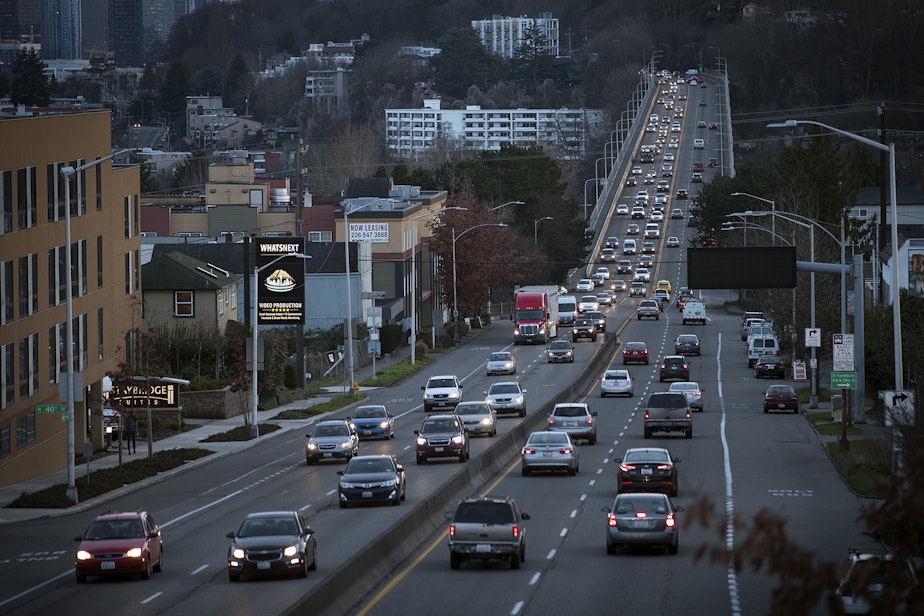Seattle City Council considers 'prostitution loitering' law amid intense debate

People packed the Seattle City Council chambers Tuesday to offer passionate testimony on both sides of the council’s effort to create a Stay Out of Area of Prostitution (SOAP) zone on Aurora Avenue North, above North 85th Street.
The bill would put new gross misdemeanors into Seattle’s criminal code, targeting people charged with prostitution-related offenses, with special emphasis on pimps and buyers of sex. (The council is also reviewing similar legislation for new exclusion zones that could ban people with drug-related charges from areas in downtown Seattle and the Chinatown International District).
Residents near Aurora described chaotic gun fights this summer that police say stem from turf battles related to sex trafficking.
“Right now on Aurora, pimps are running the show with reckless abandon and the city is letting it happen,” Sarah Loebner told the council’s Public Safety Committee.
A teen resident, Fiona Wilson, also spoke to the council.
“I just turned 14 recently and the night before my 14th birthday, I heard a woman screaming as she was shot three blocks from my house. I hear frequent gunshots and I see the girls, and it is so heartbreaking to think about because these are girls who could be in high school with me,” she said.
Sponsored
But other residents, including Carlo Alcantara, said the city has provided one effective type of relief by installing a jersey barrier to keep cars from turning off Aurora onto North 101st street, where shots were being fired.
“Almost one month later we’ve seen no gun violence on 101st and have gone from 5 to 10 911 calls per night to a single call since July 17,” Alcantara said.
Opponents of the SOAP zone legislation said the additional penalties will only further harm and stigmatize sex workers, by making them more vulnerable to profiling and arrest.
The Coalition Ending Gender-Based Violence submitted a letter saying the new zones “would limit and compromise critical pathways to safety and stability for the individuals that everyone here has been expressing concern for,” according to board co-chair Ally Jurkovich.
Aurora Commons Executive Director Elizabeth Helendi said her nonprofit can’t keep up with current demands for assistance in the neighborhood.
Sponsored
“The SOAP legislation, as written, unintentionally targets vulnerable women in the sex trade who are often the victims of trafficking,” she said.
Helendi added that there are currently only seven beds to which Aurora Commons can refer women who are seeking to exit the sex trade. Councilmember Cathy Moore, who sponsored the legislation, confirmed that number and said it’s not enough.
“I will be seeking funding in the fall for an emergency receiving center” for victims of trafficking, Moore said.
Moore said her bill specifies that diversion away from criminal charges is the preferred outcome for victims of sex trafficking; she wants the criminal penalties to be used on buyers and pimps.
“This is not the loitering bill that we had prior to 2020. I’ve taken efforts to really change it,” she said.
Sponsored
That loitering prostitution ordinance was repealed by the council. Moore said her version is similar to the ordinance currently in effect in Shoreline starting at North 145th Street, where she said it has been an effective deterrent to prostitution-related crimes.
“Shoreline has a SOAP area; it’s been in effect for 28 years," she said. "It’s been found to be constitutional. It has not resulted in the end of civil liberties as we know it, nor has it resulted in disproportionate enforcement on communities of color."
Moore’s legislation would require the Seattle Police Department to track and report the “racial composition” of people arrested and diverted to community-based services, as well those booked in jail and referred for prosecution. Police would also be required to identify any racial disparities in these numbers.
The city council’s next Public safety Committee meeting is Sept. 10, after its summer recess. A spokesperson said the full council could vote on the proposal on Sept. 17 at the earliest.




